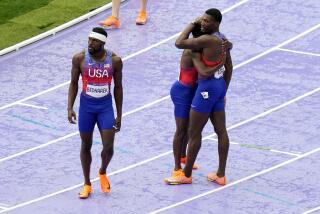A sweep comeback
- Share via
Beijing
The hurdlers did not know the improbable had happened two hours earlier, that a women’s discus thrower had won the first gold medal for the U.S. track team at the 2008 Olympics, an achievement historic and unexpected.
They were focusing on a similarly significant goal that was almost expected, a sweep of the medals in the 400-meter hurdles Monday night.
“We were telling each other, ‘Let’s go out and make history, let’s go out and get this sweep,’ ” Angelo Taylor said. “I felt like we were the best three in the world.”
Taylor, Kerron Clement and Bershawn Jackson were the best three in the Olympics, becoming the fifth U.S. trio to sweep the hurdles medals but the first since 1960.
That wasn’t as rare as what Stephanie Brown Trafton did.
She was not aware of the last time a U.S. woman had won a discus gold medal, even if she knew Lillian Copeland was the only other champion. Copeland won at the 1932 Los Angeles Olympics.
“I came to the Bird’s Nest to lay a golden egg, and that’s what I did,” Brown Trafton said.
The U.S. track team had been laying an egg, period, until its athletes collected five medals Monday to take over the total medal lead in the sport with nine to Russia’s seven.
“The USA hasn’t really had a great showing so far, and we wanted to uplift the track team with the sweep,” Taylor said.
Jenn Stuczynski helped the rebound with a silver in the pole vault, which Russia’s Yelena Isinbaeva won with her customary arrogant ease and another world record.
Isinbaeva also did her usual diva act, which often mocks the rest of the competition.
Monday, she ignored everyone else by alternately covering her face with a towel or her whole body with a quilt, ostensibly to avoid being bothered by the horde of photographers who always focus on her, more likely to give them different images to shoot.
Truth be told, Isinbaeva was delighted when the photographers had nothing else to distract them because she was jumping at record heights -- first Olympic, then world -- after every other Monday event had ended.
“I feel like a famous singer or actress. The whole stage is only for me. It’s so cool,” she said.
She gets away with acting as if she is better than everyone by being better than everyone. Isinbaeva proved that again by ending her second straight Olympic triumph with the 24th world record of her career, a vault of 16 feet 6 3/4 inches, improving her 3-week-old mark by a quarter-inch.
“If that works for her and obviously it is, she should keep doing it,” said Stuczynski, whose best jump (15-9) was 4 3/4 inches short of the U.S. record she set at the Olympic trials.
Taylor had tried the impossible at the trials, running a first-round heat of the 400 meters 23 minutes after he had made the Olympic team by finishing third in the 400 hurdles.
Even if he dropped out halfway through the latter race, it seemed a fittingly picaresque gambit for a man who had gotten through much tougher situations since becoming, at age 21, the surprise Olympic hurdles champion in 2000.
Taylor, of Decatur, Ga., endured so many physical setbacks that he became an electrician for a year to provide income that was no longer coming from track.
Despite stress fractures in both shins, he made the 2004 Olympic team in the hurdles but did not get to the final. Forced to choose between rest or surgery, Taylor did not compete in 2005.
“I don’t think I was ever close to retiring,” he said.
He still struggled to reclaim a career undone since 2004 by injuries and a reputation badly damaged by having pleaded guilty in January 2006 to contributing to the delinquency of two underage girls. Taylor received three years’ probation for incidents involving 15-year-olds in 2004 and 2005.
“That’s life; I’m not perfect,” Taylor said last year, when he won his first U.S. title since 2002. “I made mistakes. It was a learning lesson.”
In 2000, he also had won a medal in the 1,600-meter relay, only to have it stripped in 2004 because of a teammate’s doping violation, restored in 2005 on appeal to the Court of Arbitration for Sport, then stripped again two weeks ago after another relay member had admitted doping.
On Monday, he answered a question about whether he still had the medal with a roguish smile.
“I won this hurdles, and it replaces all of that,” Taylor said. “After eight years, after going through everything I went through, I’m so happy right now.”
Taylor matched the legendary Edwin Moses by winning two 400 hurdles golds eight years apart. He also should get another chance at a 1,600 gold at these Olympics.
After six years of concentrating mainly on the flat 400, he is running the hurdles better than ever.
Taylor won Monday night in a personal-best 47.25 seconds, fastest time at the Olympics since 1992.
“I haven’t run fast since 2001,” he said. “I feel like I am on top of the world.”
--
Philip Hersh covers Olympic sports for The Times and the Chicago Tribune.
--
Begin text of infobox
No barriers to success
From the 1936 Games in Berlin to the 2000 Games in Sydney, the U.S. won gold in the men’s 400-meter hurdles every time except 1968 (David Hemery, Britain), 1972 (John Akii-Bua, Uganda) and 1980 (did not participate). A look since 1984:
1984: GOLD
Edwin Moses, USA 47.75
1988: GOLD
Andre Phillips, USA 47.19
1992: GOLD
Kevin Young, USA 46.78 WR
1996: GOLD
Derrick Adkins, USA 47.54
2000: GOLD
Angelo Taylor, USA 47.50
2008: GOLD
Angelo Taylor, USA 47.25
More to Read
Go beyond the scoreboard
Get the latest on L.A.'s teams in the daily Sports Report newsletter.
You may occasionally receive promotional content from the Los Angeles Times.






